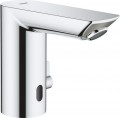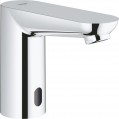Jet depth
Distance from the fixing point (for vertically mounted taps) or from the centre of the mounting hole (for horizontally mounted taps) to the middle of the spout. It is a characteristic that determines the "reach zone" of the tap.
Jet height
The jet height is usually specified for taps with horizontal installation (see "Type of installation"). It is measured from the base of the tap to the spout outlet. The large height of the spout is important primarily for kitchen models (see "Suitable for"), because it allows you to place large dishes in the sink. This parameter is directly related to the height of the spout (see above): the height of the jet cannot be greater than the height of the spout. Thus, in fact, one has to find a compromise between the height of the jet and the dimensions of the tap, especially if there is little space for its installation.
Water jet angle
The angle of the water jet produced by the tap, relative to the vertical. Generally stated for full head; with partially blocked water, this angle is smaller. Anyway, the water jet is usually directed towards the user, and the greater the angle of inclination, the farther from the spout the point of incidence of the jet will be placed. However, in most cases this point is not critical; problems can arise only in very cramped conditions, with small basin sizes.
Features
The functions of a mixer mainly consist of design features, among which are the presence of a
check valve, a
pop-up waste,
cold start,
LED lighting, a
temperature control lever, a
display,
auto-drain (hygienic rinse), a
switch for washing machine/dishwasher, and a
shelf for accessories. More details:
— Check valve. A check valve prevents water from moving backward through the mixer, for example, when there is a significant pressure difference between hot and cold water. This feature is relevant for those planning to install water meters: the presence of check valves on mixers is often a mandatory condition for installation requests, as such valves prevent meters from running backward. Additionally, it's worth noting the presence of a check valve in the mixer (especially single-lever ones, see "Mixer Type") if your home's water supply is prone to interruptions — such mixers perform much better during pressure surges in the plumbing.
— Pop-up waste. A device that allows you to close the drain hole in a sink, kitchen sink, or bidet (depending on the purpose of the mixer). It comes in two types:
— Lever pop-up waste. This type of valve is operated by a small
...lever located behind the mixer, to the side, or at the front of the body. Raising and lowering it opens and closes the sink's drain plug.
— Push-button pop-up waste. Valves of this type are locked and unlocked by pressing the drain hole plug, which requires wetting your hand.
— Cold start. A feature found exclusively in single-lever models. The general principle of "cold start" is as follows: if you open the mixer with the joystick in the central (default) position, only cold water will flow out, not mixed warm water (as in more traditional single-lever devices). To add hot water and increase the temperature, you need to move the lever from the default position. This operation format can provide noticeable savings: by default, cold water flows from the mixer, and hot water is added only as needed.
— LED lighting. A lighting system based on LEDs — an efficient and economical light source. The purpose and functionality of such lighting can vary. In some models, it is installed on the spout and directed downward, allowing you to see the space under the mixer well even in low external lighting. Sometimes this lighting also illuminates the water stream, giving it an unusual appearance. There are also quite original systems — for example, with a transparent spout and LEDs at its base, creating the effect of a mixer glowing from within; in some models, the lighting even changes color depending on the water temperature. However, in any case, this feature significantly affects the cost, so it is mainly characteristic of premium-class products.
— Auto-drain (hygienic rinse). This system is equipped in mixers with additional electronics — mainly contactless models, as well as products with a thermostat or button activation. Auto-drain works as follows: at certain intervals (for example, once every 12 hours or once a day), the automation briefly turns on the water. This washes out harmful bacteria that tend to multiply on the internal surfaces of the spout and in the "stagnant" water inside the mixer. At the same time, the water consumption for hygienic rinsing is small, usually almost unnoticeable against the background of overall consumption.
— Temperature control lever. A feature found in mixers whose design initially does not include a temperature regulator — primarily contactless models, as well as products with one main lever or button activation (see "Mixer Type"). As the name suggests, the temperature control lever allows you to use such a mixer not only for controlling the flow but also for changing the water temperature.
— Display. Mixers that display the temperature and/or current water consumption. The display provides a clear visualization of settings and allows you to see what water and in what volume is flowing from the tap. However, the presence of a screen significantly affects the cost of the mixer.
— Switch for washing machine/dishwasher. A feature that can significantly simplify the connection of a washing machine or dishwasher to the water supply system. Mixers with a switch for a washing machine/dishwasher have a separate pipe for connecting the machine, as well as a switch that allows you to open and close the water supply to this pipe. Thus, to connect a washing machine or dishwasher, there is no need to install additional bushings, splitters, etc. — just connect the device to the existing outlet. And you can control the water supply directly from the mixer body, without having to crawl under the sink or into another hard-to-reach place.
— Shelf for accessories. Most often, the role of such a shelf is played by the upper part of the body, specially made flat. This feature is mainly found in mixers for baths and/or showers (see "Purpose"): it is convenient to keep shampoos, gels, soap, and other cosmetic/hygienic products on the shelf.
Note that this feature is rare — mainly in high-end mixers (in particular, thermostatic ones) that initially have large body sizes. In more traditional models, there is no point in providing this design element — it is more reasonable to purchase a shelf as a separate accessory for the bathroom.Water flow
The maximum water flow during the operation of the tap, in other words, the maximum amount of water that it can pass through in a minute. This characteristic is important, foremost, for models designed for baths (see "Suitable for"): the greater the throughput, the faster the bath will fill. However, the meaning of this paragraph is not limited to this. First, flow information can be useful in certain calculations related to water supply — for example, to calculate the required pump capacity. Secondly, high-end taps can be equipped with aerators to achieve a powerful and efficient jet with low water consumption; the consumption indicated in the characteristics allows you to evaluate the efficiency of such devices in comparison with analogues.
Min water pressure
The lowest inlet pressure at which the tap is able to fully perform its functions of unhindered water supply.
Max water pressure
The highest inlet pressure at which the tap is able to operate in a trouble-free mode with minimal risk of premature failure. In other words, this is the ultimate strength of the tap. Note that for normal east european use, it can be assumed that the maximum pressure in the water supply is 6 bar. One should focus on that value and choose a model with a small margin of max pressure in order to avoid leaks in the tap nodes during pressure surges in excess of the norm. Note that in plumbing with a centralized water supply, the pressure can reach 10 bar. Therefore, for expensive taps that make high demands on the inlet pressure, it is necessary to buy special reduction gears.
Inlet communication
The type of water pipes the tap is designed for.
— Hoses. With a flexible connection type, polymer tubes (hoses) are used to connect the tap to the water supply, which can bend well and are reinforced with a metal mesh for strength. This ensures ease and versatility of attachment — thanks to the flexibility of the pipe, it can be carried even in cramped places. On the other hand, such a supply is less durable and reliable than a rigid one. It is mainly used in models for kitchens and sinks (see "Suitable for"). Installation pipes may be included in the package of the tap; this point should be clarified separately.
— Rigid pipes. Such taps are designed for installing directly to metal water pipes. The advantage of this type is reliability and strength, the disadvantage is significant restrictions on the installation site: you either have to put the tap where the pipes were made during construction, or redo the communications, which is associated with great inconvenience and cost. On the other hand, such taps are usually used for bathtubs and showers, and in modern bathrooms, typically there are no problems with unsuccessful installation of pipes.
Tap height
The height of the tap, measured from its base or lowest point to the highest point of the spout. The height of the spout partly determines the installation possibilities — in fact, this is the minimum vertical free space that is required for the tap. In addition, in models with horizontal installation (see "Type of installation"), the spout height is related to the jet height (see below).

